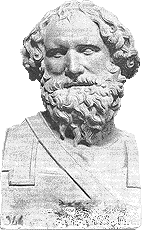 |
Geometry |  |
 |
Geometry |  |
Ancient civilizations developed a numerical (emprical) mathematics to solve practical problems. When not used for simply counting herds or flocks, the Egyptians and Babylonians both invented whole numbers, fractions, arithmetic, and geometric relationships sufficient for commerce, administration, taxes, astronomy, determining of seasons, and large engineering works. The historian Herodotus states that geometry was the gift of the Nile since it wiped out boundaries, requiring annual surveying of the land. The classical Greeks went beyond the empirical by stressing the use of reason. In the 7th century BC Greek mathematicians, beginning with only a few basic geometric concepts, developed thousands of new mathematical relationships based solely on reason, not experience. Here are some of them:
Thales of Miletus
Foundations
of Greek Geometry
The Day the
Universe Changed
Pythagoras
Generalization
of the Pythagorean Theorem
Proof
of Pythagorean Theorem
Grandfathers
of Geometry
Euclid
The Return of Odysseus and the
Elemants of Euclid
Euclid's Biography
Archimedes
Drexel University -
Archimedes
Archimedes'
Method of Estimating Pi
Archimedes
of Syracuse
Apollonius of Perga
Apollonius
of Perga
Apollonius
Eratosthenes of Cyrene
Eratosthenes
Sieve of Eratosthenes
The University of
Utah-Eratosthenes
Hypatia
The
Life of Hypatia
Agnes Scott College -
Hypatia
Return to Main Menu